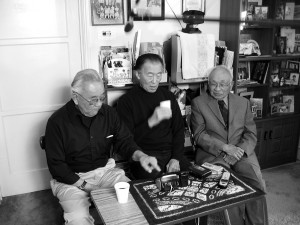Frank Emi, one of the prime movers of the Heart Mountain Draft Resisters, passed away on December 1, 2010. His funeral will be December 10, 2010 at the Nichiren Buddhist Temple, 2810 East Fourth Street, Los Angeles at 10:00 a.m.
For a full story on Frank Emi’s life, please see Martha Nakagawa’s article in the Rafu Shimpo.
From Amerasia Volume 33, Number 3 (2007)—”World>War<Watada,” this excerpt describes Emi’s role in the Heart Mountain Fair Play Committee:

The Resisters teleconference with Lieutenant Watada: (from left to right) Yosh Kuromiya, Frank Emi, and Paul Tsuneishi. From Curtis Choy's DVD "Watada, Resister." Photograph courtesy of Curtis Choy
Frank Emi, Yosh Kuromiya, and the Heart Mountain Resisters
While interned, second generation Japanese American Frank Emi refused to sign a government loyalty document renouncing allegiance to Japan. He never had an allegiance to Japan, so how could he renounce such an allegiance? The U.S. government, he remarked, asked “a very stupid question.” The U.S. government had forced the Southern California-raised Emi to sell his family’s business for six percent of its value and had imprisoned him at Heart Mountain. There, his wife bore a son into a world without the rights Emi once possessed as a U.S. citizen.
As a married man with children, Emi was not eligible for the military draft. He nevertheless stepped forward to help form the Fair Play Committee (FPC) at the Heart Mountain internment camp and to spearhead the resistance against the draft of male internees. The FPC professed loyalty to the U.S. in part by supporting the restoration of Japanese American civil rights. It fought the military draft because “it was unfair, unjust, immoral and legally questionable.” The group’s circulars revealed the harsh deprivation of the American civil liberties and roused internees’ support. To stop the spreading protests, Wyoming’s U.S. Attorney indicted Emi and six others for conspiring to counsel, aid, and abet Heart Mountain’s draft-age Japanese Americans in evading the draft.
These defendant-resisters argued that they did not engage in a “guileful and stealthy avoidance of the duty to serve.” Instead, they encouraged interned young men to test the legality of applying selective service laws to people incarcerated based on race. They viewed their acts as patriotic efforts to uphold the U.S. Constitution—to establish Japanese Americans’ right to equal treatment as U.S. citizens. Federal Judge Eugene Rice convicted the FPC leaders and sentenced them to four years in federal prison. After one-and-a-half years of incarceration, the Tenth Circuit Court of Appeals overturned the resisters’ convictions because the judge’s jury instructions “prevented the jury from considering whether the FPC ever urged Heart Mountain’s Nisei to ‘evade the draft. . .as opposed to refusing it out of a good-faith belief that the draft law was unconstitutional as applied to people illegally confined on account of their race.”
Excerpt from: “From Heart Mountain to Iraq: Lieutenant Watada and a Long Line of Resistance” by Eric K. Yamamoto and Ashley Kaho’omino’aka Kaiao Obrey. Eric K. Yamamoto is Professor of Law, William S. Richardson School of Law, University of Hawaii. Ashley Kaho’omino’aka Kaiao Obrey is a student at the William S. Richardson School of Law, University of Hawaii.
For interview video clips of Frank Emi and a short biography, please see the Discover Nikkei website.
Below is an excerpt from Curtis Choy’s documentary film Watada, Resister that features Frank Emi:
There is another blog posting on Frank Emi by Gann Matsuda on the Manzanar Committee website.

 Amerasia on Facebook!
Amerasia on Facebook!